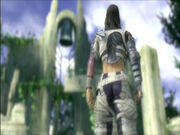Dream Trigger[]

Dream Trigger
City of Numara - Ghost Town - City of Ruins - Walk past the flower bed (near the bell tower) after Lirum's funeral.
Transcript[]
Rolling farmland spread out before him, Kaim harvests vegetables, wielding his hoe with deep concentration.
The sky on this autumn evening is a deep crimson.
“Maybe we should call it a day,” says the heavyset woman who owns the farm. She drops an armload of vegetables into the basket.
Kaim nods and wipes the sweat from his brow.
“You’re a tremendous help,” says the woman. “Look how much we’ve done!”
Kaim responds to her praise with a slight nod.
“You still can’t remember where you came from?” she asks.
“Afraid not…”
“Well, the way you work,” she says with an easy laugh, “I don’t care if you’re from the moon!”
“Seriously, Kaim. What will you do when the harvest ends?”
“I don’t know yet, I haven’t made up my mind.”
“There’s plenty of work to do here even in the winter,” she says, “It’d be fine with me if you wanted to stay on a while longer…”
“Thank you,” says Kaim.
She herself is a hard worker and a warm human being.
This is not a life that allows for luxuries, but going out to the fields at dawn every day and ending work as the sun goes down softens the heart even as it toughens the body.
As they prepare to leave the field, a small bell begins to ring.
The hour is still somewhat early for the church’s evening bell.
Kaim glances down to the road at the base of the hill. A funeral procession advances slowly along the road, the mourners surrounding a horse cart bearing a coffin.
The woman sets her hoe on the ground, removes her headscarf and clasps her hands together. Kaim scans the hills to find that all the other workers on the surrounding farms are doing the same thing: clasping their hands, bowing their heads, and closing their eyes in the direction of the passing funeral.
Kaim follows their example.
The old man leading the funeral procession swings the little bell.
Its ringing echoes among the hills.
The mourners pass in silence.
The women in black veils,
The men in black coats, heads bowed.
The children in the rear elbow each other playfully, unaware of the meaning of death.
When the funeral has passed, the woman raises her head and blinks her moistoned eyes.
“The one who paddes away is going home,” she says.
“Home?” Kaim asks, somewhat startled.
“Home… to the soil… to the sky… to the sea. Like all living things.”
Kaim nods in silent recognition.
How many deaths has he seen in this endlessly long life of his?
All those people leave this world of ours and we never see them again. In that sense, death is an infinitely sad event.
If, however, we think that in dying they go back to their homes somewhere, a certain comfort and even joy comes to mingle with the sadness.
But Kaim – who can never grow old or die – can never go home.
The woman scoops up a handful of earth and says with deep feeling, “Many lives have become part of this soil – the lives of tiny living things we can’t see, the lives of withered grass … If you think about it that way, our vegetables are made for us by the lives of many others.”
“I see…”
“Can I ask you a favour, Kaim?”
“Of course…”
“If I should die while you’re working here, would you scatter some of my ashes on this field for me? A handful would do.”
Kaim is at a loss for words. He forces a smile.
Husband dead, children on their own, the woman lives by herself on the farm.
Kaim know that if he goes on working here, like it or not, he will eventually have to watch over the woman’s deathbed, even if she were to die one hundred, two hundred years from now.
The church bell rings, signalling the end of the workday.
The woman clasps her hands before her as she did when the funeral passed.
“I have been allowed to come safely through one more day. For this I give my heartfelt thanks. May tomorrow be another healthy day for me…”
Her voice in prayer resounds forcefully in Kaim’s breast. This happens every time he hears the church’s evening bell: the conviction overtakes him that he does not belong here.
“Ma’am,” he says to the woman after the last chime resounds.
“Yes?”
“Wouldn’t you say that people give thanks for each safe day, and pray for good fortune in the day to come, because they know their lives will ende?”
“Wha- what’s wrong, Kaim?”
“I’ll be leaving the village when the harvest is over.”
“Why, all of a sudden…? What’s happened?”
“I have no right to live here,” he says.
Ignoring her stupefaction, Kaim lifts the vegetable basket in both arms.
He takes another good, long look at the setting sun.
“Where will you go, Kaim, if you leave here?”
“I don’t know. Somewhere.”
“Are you just going to keep wandering like this?”
“I don’t have anyplace to go home to,” says Kaim.
Hoisting the basket onto his shoulder, he starts down the hill.
His back glows red in the setting sun.
End.